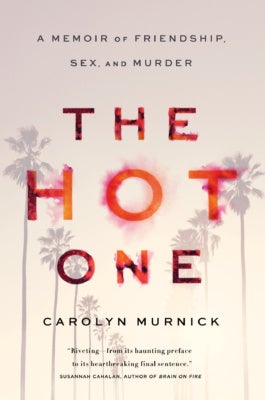 In 2014, Carolyn Murnick came to the Aspen Summer Words writing conference as an Emerging Writer Fellow. At the time she was just starting to work on her debut memoir. Recently published by Simon & Schuster, The Hot One follows Murnick’s quest to find answers after the brutal murder of her childhood best friend, Ashley Ellerin. The memoir is more than a riveting murder mystery; it is a thoughtful and poetic examination of womanhood in the 21st century and the complexities of female friendship.
In 2014, Carolyn Murnick came to the Aspen Summer Words writing conference as an Emerging Writer Fellow. At the time she was just starting to work on her debut memoir. Recently published by Simon & Schuster, The Hot One follows Murnick’s quest to find answers after the brutal murder of her childhood best friend, Ashley Ellerin. The memoir is more than a riveting murder mystery; it is a thoughtful and poetic examination of womanhood in the 21st century and the complexities of female friendship.
This summer, Murnick rejoined Aspen Words to talk about her writing process, the research behind the book, and its place in the current cultural moment.
Tell us a bit about your Summer Words experience and how it fit into the process of writing and publishing this book.
I sold my memoir in 2010, and by the time I got to Aspen I was at a bit of a crossroads. I had intended to structure The Hot One around the trial of my childhood best friend’s alleged killer, which was supposed to have started by 2011, but due to unforeseen circumstances and lots of twists and turns in court, a trial date still had not been set by 2014. (Spoiler alert: as of now, summer 2017, the trial still hasn’t started!)
I had gotten multiple extensions from my publisher and was committed to waiting it out, but I was beginning to lose momentum and perspective. In the middle of all that came Aspen Summer Words, which turned out to be a fantastic week of reading, writing, and enjoying the outdoors in one of the most beautiful places on earth. I ended up making a handful of Brooklyn-based writer friends at the program who are still among my favorite people.
A year later, I decided to re-conceive my narrative and began working on completing a draft of the book without the trial. I started my third writing group with a group of women writers, including two Aspen alums, and we met at my place every month to share our work. With the help of that group, combined with some newfound insights that only time can bring, I was able to finish a first draft of The Hot One by the end of 2015. I worked on edits for the first half of 2016 and my book went into production by the end of that summer, and now, here we are!
Did you begin writing a memoir because you felt compelled by what happened to Ashley or had you always thought about writing a book?
Throughout my twenties, as the years went on and Ashley’s case was still unsolved, I felt that one day, if I ever wrote a book, it would be about searching for answers about her murder. Ashley was my “friend who got away,” which I think is an experience everyone has had in one way or another, whether you’ve lost someone to death or simply to life-paths diverging. You always kind of wonder if you should have stayed in touch, and the relationship becomes a touchstone for your life and growth, a way to see how much you’ve changed as you look back.
As I began to talk about Ashley in the years after she died, I realized that people were connecting to her story and to that universal sense of wistfulness for the road not taken. I wanted to honor those formative relationships we’ve all had and, to me, searching for answers about what had happened to her and trying to get closer to the truth was my way of doing that. I’m not sure I would have written a book at all if it weren’t for feeling driven to pursue this story.
What was the most difficult part about researching and writing about the murder of someone who was once your closest friend?
I’m an editor at New York magazine, but my beat is restaurants and travel. Nothing in my background prepared me to pore over coroner’s reports and transcripts, interview people who had lost a loved one, or attend court hearings. When I was at one of those hearings, one of the defense attorneys asked me why I was there and then answered his own question. “You’re here to bear witness,” he said.
That was something I thought about a lot during the reporting and writing of this book. The phrase stuck with me: to bear witness. What is the value of bearing witness? It means not turning away, not abandoning my friend. There are things that I learned, documents that I read that no one ever wants to read. Medical examiner reports detailing each of the forty-seven stab wounds Ashley received. This is the stuff of nightmares. It’s unspeakable. But as much as I would like to turn away, to not read these things, I can’t look away because that would mean turning my back on Ashley. It would mean leaving her to experience the worst moments of her life alone. Ashley had to experience all of this, and the least I can do is read about it.
The man charged with Ashley’s murder will go on trial this fall. How are you feeling about that occasion, especially now that your memoir is out?
People have asked me a lot about closure as it relates to this book and to the upcoming trial. For me, if and when Michael Gargiulo is convicted, that won’t be the end. Some losses are too big to ever be wrapped up in a little bow. I’m not sure closure is ever really possible after something like this; in many ways, my sense of loss has only deepened as the years have passed.
The Hot One is entering the world at a time when interest in true-crime stories like ‘Serial’ and ‘Making a Murderer’ are really picking up – how do you feel your book fits into the larger cultural moment?
There’s clearly a real hunger for compelling, sophisticated storytelling around crime and justice, and I understand why. True crime is often a way into discussing larger issues like sexism, racism, and corruption and it can inspire a sense of ‘there but for the grace of God go I’ in the viewer/reader. We’re in a particularly uncertain, polarizing time in our culture, and these are stories that force us to examine our prejudices.
The Hot One is certainly in the tradition of that kind of storytelling: I follow a complicated murder case, I search for answers. However, my book is not a true-crime story in the typical sense. It’s not a whodunit, and things don’t get cleanly tied up at the end, because the alleged killer is still awaiting trial. Instead, I’m more interested in the emotional implications of loss, and the gray areas inherent in any kind of truth seeking. I also want to offer a feminist perspective on the true-crime genre, a la the ‘My Favorite Murder’ podcast: No victim-blaming, no slut-shaming, and no glorification of the killer.
Do you have any tips for aspiring writers?
Cultivate writer friends. Nothing is more encouraging and heartening and soothing than talking about this whole crazy-making process with someone who knows. And, this isn’t quite writing advice, but more like advice for being a writer: When someone asks you how your book is going, no matter how you’re feeling about things, you can always say: “I’m in the thick of it!”


